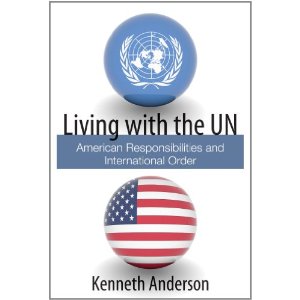
My book,
Living With the UN: American Responsibilities and International Order, is now in stock and on-sale at the Hoover Institution Press website. I have a copy in hand and I’m delighted to be holding it. It’s not quite like holding your new baby – but for an inanimate object, it’s closer than you might have thought. (Julian - feel free to weigh in here: I'm thinking having one's new book in hand is kind of like holding one of those Japanese roboticized teddy bears for soothing the elderly with dementia, but maybe that's just me.)
It will be a couple of weeks – April 17 – before it's available through
Amazon, Barnes & Noble, and other online sellers. A Kindle edition will be released on April 17 as well. Over the next couple of months, I will be talking about various themes in the book – UN-US relations, the nature of the UN, the different ways in which the US should engage (or not) with different parts and functions of the UN. Julian will be doing the same with his and John Yoo's provocative new book,
Taming Globalization, so expect to hear a lot at OJ about themes in our books (we have, btw, covertly set up an algorithm in which the more OJ readers buy our books,
the less we will talk about them!). To start with, however, I wanted to go to a very different topic – this one about publishing, choosing a publisher, and why I chose the
Hoover Institution Press. This follows on some excellent guest posts by senior academic press editors in the past here at OJ - I'm really extending my take on those past discussions. I'm hoping that my thinking here will be useful to some OJ readers thinking about publishing.
This is a policy essay, not a “scholarly” book – it has about twenty footnotes for the whole thing, and a bibliography of secondary sources aimed to be accessible to those without a university research library or knowledge of how the UN online archives work. My interest in this case is dissemination of the ideas in the book, not staking out academic turf. So my general choices were three: One, find a commercial trade publisher, which seemed improbable given the subject matter, the way it is written, and my lack of trade press publishing in the past. Two, find a university or academic press; this seemed like the obvious thing, and in fact there were several options that direction, notwithstanding that this is something like the opposite of the dense academic monograph. Third, go with a think tank policy press in which case, given the history of the project and my affiliations, it would be Hoover.
The Hoover publishing folks have been marvelous. They have been fabulous on production values, editing and copy editing, all the professional production elements. They have been patient to a fault in waiting for the manuscript and letting me make later changes. And they have excellent marketing staff and have a commitment to getting the book out there in a way that is only sometimes true of academic presses whose primary audiences are academics and university libraries. But several academic presses are great in all these ways, too, so one has to ask, why consider a think tank press? After all, isn’t a think tank press – even one associated with a university, like Hoover, and moreover a conservative think tank – taking a hit in academic prestige and respectability?

